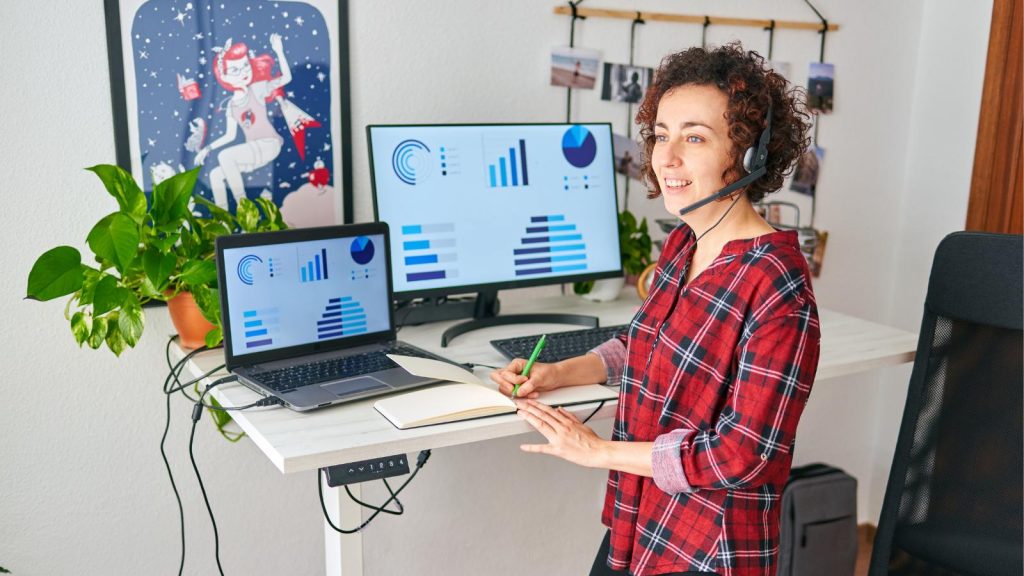More people than ever are working from home. Some people freelance, others run a business from home, and more work for a company – but from the comfort of home. Setting up a home office for remote work for your comfort and productivity is key to getting more done from home. That’s why I’ve created a home office setup guide for you.
A home office has long been a mainstay of many professionals, and it is quite personal. The home office should be where you can work in peace and feel creative or motivated to get your work done.
If you have a home business or freelance, it started as a small enterprise, but you need more space. As you look for your new piece of real estate, it is essential to keep the idea of a home office firmly in mind.
Here are tips for setting up home office in small spaces for remote work and what you should consider as you do so.
Table of Contents
Space For Home Office
Ideally, you shouldn’t be working in a basement as this will not give you the light you need to be productive and motivated. You should be looking for a space that is free from foot traffic from other people who live in the home.
Look for an area of the home you have no, or the potential new home that offers you space to work, space, produce and create in the best way possible.

Tips For Setting Up A Home Office For Remote Work
Not every home business will only need a single desk and a laptop. Some need more working surfaces, specialized equipment, controlled temperatures, or even ventilation.
Make a list of everything you would need in your working space to maximize your working day.
You should also consider things like flooring. If you paint or create in ways that are often messy or may lead to items being dropped on the floor, is carpet a good idea?
Hard flooring is typically an excellent idea for many home offices.
Laminate or hardwood floors are easy to clean and maintain for almost all home office requirements.
Surface For Home Office
Designers and creators will often need more than a single working surface. Ensure that you know how much room you need.
Graphic drawing desks often don’t take up too much room horizontally, but you’ll need the vertical room – and plenty of light.
If you write a lot, either by hand or on a computer or laptop, you’ll need space for notebooks, jotters, keyboards, and more.
If you are upsizing your home to allow for this, then try to consider all of the worksurfaces that you may need in advance.
Setting Up Your Office Desk
Small Desk
As you are setting up a home office for remote work you will need to consider what kind of desk you need.
If you’re short on space, a small desk might be your best option. Small desks typically come with attached shelves or drawers, which can help you stay organized.
They also usually don’t require any assembly and are easy to store away when not in use.
The downside is that these desks may not be very comfortable for long-term use, as they are often too low or too small for an ergonomic setup.
Standing Type Desk
Standing desks are becoming increasingly popular due to the health benefits associated with standing while working. These desks allow you to adjust the height so that you can stand comfortably while working, which can reduce back pain and improve posture.
However, they can be expensive and bulky, so they may not be suitable if you have limited space in your home office.

Ergonomic Desk
An ergonomic desk setup is designed specifically to provide maximum comfort while working by allowing users to adjust their posture throughout the day.
Ergonomic desks typically have adjustable features such as monitor arms, keyboard trays, and footrests so that you can find the perfect position for your body type without sacrificing comfort or productivity.
Although they tend to be more expensive than other options, ergonomic desks are worth investing in if you plan on spending long hours at your desk each day.
Selecting the Right Desk Setup
When selecting a desk setup for your home office, it’s important to consider your budget and how much space you have available before making a decision.
If possible, try out different types of desks before committing to one so that you can determine which one works best for you.
This test run will ensure that you make an informed decision about what type of desk will best suit your needs.
Sitting In Your Office Chair
Even if you aren’t sitting at a desk as you work, you will need somewhere to sit comfortably. Consider the type of sitting arrangement that you would enjoy.
Do you want a high-back, deep seat with a coffee table nearby for moments when you are researching or studying?
Your office chair is one of the most important things for setting up a home office.

Perhaps you spend many hours in your office in deep thought and need something closer to a chaise lounge.
Consider how you like to sit, and factor that into the space requirements. You should have somewhere that is comfortable to sit for you within the office.
If your main focus is creating somewhere with incredible productivity, read this: How to Create a Cool Man Cave Office to Increase Productivity.
Pictures To Inspire Your Home Office Set Up
Another thing to keep you motivated working from home is pictures for your office. Oftentimes, many small business owners will have a quote nearby.
My favorite quote is:
Faith, to hope for things which are not seen but are true.
Another quote I have hanging up is:
Effort = Results by Roger Penske.
Others may have pictures of places they want to vacation to or of their family that inspire them.
Setting Up A Home Office For Remote Work With Lighting
One of those challenges is setting up your home office lighting correctly so that you can see well as you work.
In this blog post, we’ll discuss what you need to know in order to set up your home office lighting for optimum comfort and productivity as you are setting up a home office for remote work.
Choosing the Right Bulbs
The first step in setting up your home office lighting is choosing the right bulbs for your space. Natural light is always best if possible, but it’s not always an option.
If you don’t have enough natural light in your workspace, consider investing in energy-efficient LED bulbs or eco-friendly CFLs (Compact Fluorescent Lightbulbs).
However, a note of caution on LED bulbs: If you were thick eyeglasses you can burn your eyes from them if close by. (Been there, done that, and thus resulted in an ER visit.)
Not only are both of these options more efficient than incandescent bulbs, but they also provide a brighter, whiter light that will help reduce eye strain and fatigue while you’re working.
Positioning Your Lights
Once you’ve chosen the right bulbs for your workspace, it’s important to position them correctly. Ideally, they should be placed above your head at a 45° angle and aimed down toward your desk or workspace.
This position will ensure that the light source isn’t coming directly into your eyes, which can cause eye strain and headaches over time.
It’s also important to make sure there are no harsh shadows being cast on any part of your workspace, as these can create glare and decrease visibility when looking at computer screens or other documents on your desk.
Additionally, using a dimmable switch can help control the intensity of the lights in case you need more or less illumination depending on the task at hand.
Office Equipment
In Conclusion: Setting Up A Home Office For Remote Work
What is your favorite thing to set up your home office? What things do you need to be more comfortable and productive?
I know for me it’s a great chair to sit in. After having sciatica problems in the past, today I sit upright in an ergonomic chair when working away on the computer. I also have a stool to put my feet up under the desk for added comfort.
Home Office Set Up Guide For Your Small Business After Moving Share on X



